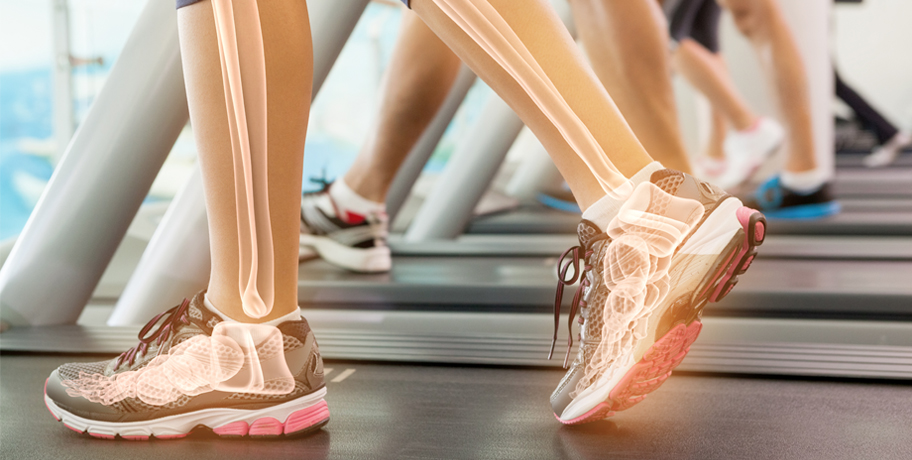
Osteoporosis, Bisphosphonates, Vitamin D, and Calcium Supplements
Osteoporosis is a common issue among women after menopause. In Sweden, approximately 70,000 fractures per year1 are due to osteoporosis—most commonly affecting the wrist, upper arm, hip, or vertebrae. Often, the issue of overly porous bones isn’t discovered until a fracture has occurred.
A common treatment for osteoporosis includes bisphosphonates along with vitamin D and calcium supplements. Bisphosphonates prevent a type of immune cell (osteoclasts) from breaking down unnecessary bone tissue. Vitamin D and calcium provide the body with additional calcium needed to strengthen bones.
A major drawback of bisphosphonates is their potential to cause unpleasant side effects such as heart problems and stomach ulcers. In rare cases, they can even lead to osteonecrosis (bone death). In fact, long-term use increases the risk of fractures. One study found that women taking bisphosphonates regularly for five years had three times the risk of fractures not typically associated with osteoporosis, such as breaks in the middle section of the femur.2
Another issue is that vitamin D and calcium supplements without sufficient vitamin K intake can result in calcium ending up where it’s not needed. Instead of being incorporated into osteoblasts—the cells that form bone—it can accumulate in blood vessels, increasing the risk of calcifications.3,4
K for Calcium Regulation
Leafy greens are rich in the fat-soluble compound known as vitamin K. The "K" stands for coagulation, as the vitamin is essential for blood clotting. However, it also plays a role in bone tissue formation.
Vitamin K regulates the body's calcium metabolism, ensuring more calcium ends up in bone cells and less is excreted in urine. This regulation also seems to help prevent calcifications in blood vessels and other tissues.
Vitamin K comes in two main forms: phylloquinone (K1) and menaquinone (K2). K1 is primarily found in leafy greens and is produced during photosynthesis. The darker green the plant, the more chlorophyll and vitamin K it contains. K2 is produced by gut bacteria and is also found in moderate amounts in animal products and fermented vegetables such as sauerkraut, Korean kimchi, and the soybean dish natto.
The K1 in leafy greens can be converted to K2 in the body, but the amount is relatively small because K1 absorption from vegetables is low—about 5%, or up to 13% if consumed with some fat (as vitamin K is fat-soluble). In contrast, the absorption of K2 from fermented foods is significantly higher. Virtually all dietary K2 is absorbed.5
An effective way to combat osteoporosis may therefore involve a diet rich in leafy greens, fermented foods, moderate amounts of high-quality protein, healthy fats, and engaging in weight-bearing exercise such as hiking, running, aerobics, and racket sports. Additionally, if you take vitamin D and calcium supplements, adding vitamin K to your regimen can be a smart strategy.
Vitamin K Supplements as Effective as Bisphosphonates
Several research studies have shown that vitamin K deficiency can increase the risk of fractures and that vitamin K supplementation can mitigate this risk. Given their diet rich in leafy greens and fermented soy, the Japanese have been particularly interested in exploring the effects of K2 on bone health. One group of Japanese researchers hypothesized that K2 has a stronger impact on bone health than K1. They followed 241 osteoporotic women who took a high-dose K2 supplement (45 mg per day) for two years. The results showed that K2 significantly reduced fracture risk and prevented bone loss in the lumbar vertebrae.6
In another Japanese study, researchers found that the same dose of K2 (45 mg) was as effective as the bisphosphonate drug etidronate in preventing spinal fractures among postmenopausal women. This study also showed that K2 increased bone mass, although not as much as the medication.7
Another study found that K2 has the same bone-strengthening effects at lower doses (180 micrograms/day) when using the natural form of K2 (menaquinone-7), as opposed to the synthetic form (menatetrenone) used in the two Japanese studies mentioned above.8
Vitamin K is safe to take as a supplement, except for people on blood-thinning medication, due to its coagulating properties. If you take blood thinners, you should avoid both K1 and K2 supplements.
The best approach is to combine K2 and D3 vitamins with magnesium, a mineral many people are deficient in, as it complements the body's calcium levels. Magnesium helps the body retain calcium in cells where it is needed and essentially acts as a natural calcium blocker.
Author
Scientific references and sources
Show reference1 SBU. Bensköra får dåligt skydd efter fraktur. 2003-11-20. Hämtad 2016-10-18.
http://www.sbu.se/sv/publikationer/vetenskap--praxis/vetenskap-och-praxis/benskora-far-daligt-skydd-efter-fraktur/
2 Saita Y, Ishijima M, Kaneko K. Atypical femoral fractures and bisphosphonate use: current evidence and clinical implications. Ther Adv Chronic Dis. 2015 Jul;6(4):185-93.
3 Thompson GR1, Partridge J. Coronary calcification score: the coronary-risk impact factor. Lancet. 2004 Feb 14;363(9408):557-9.
4 Kramer CK, Zinman B, Gross JL, Canani LH, Rodrigues TC, Azevedo MJ, Retnakaran R. Coronary artery calcium score prediction of all cause mortality and cardiovascular events in people with type 2 diabetes: systematic review and meta-analysis. BMJ. 2013 Mar 25;346:f1654.
5 Geleijnse JM, Vermeer C, Grobbee DE, Schurgers LJ, Knapen MH, van der Meer IM, Hofman A, Witteman JC. Dietary intake of menaquinone is associated with a reduced risk of coronary heart disease: the Rotterdam Study. J Nutr. 2004 Nov;134(11):3100-5.
6 J Shiraki M, Shiraki Y, Aoki C, Miura M. Vitamin K2 (menatetrenone) effectively prevents fractures and sustains lumbar bone mineral density in osteoporosis. Bone Miner Res. 2000 Mar;15(3):515-21.
7 Iwamoto J, Takeda T, Ichimura S. Effect of menatetrenone on bone mineral density and incidence of vertebral fractures in postmenopausal women with osteoporosis: a comparison with the effect of etidronate. J Orthop Sci. 2001;6(6):487-92.
9 Knapen MH, Drummen NE, Smit E, Vermeer C, Theuwissen E. Three-year low-dose menaquinone-7 supplementation helps decrease bone loss in healthy postmenopausal women. Osteoporos Int. 2013 Sep;24(9):2499-507.
